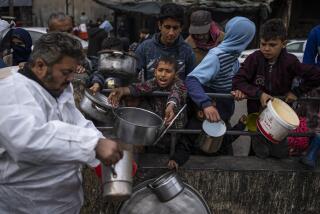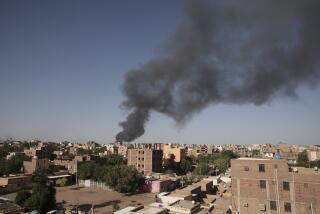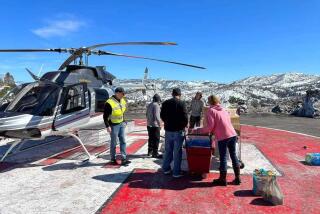U.S. Airdrop of Aid to Eastern Bosnia Begins
- Share via
OVER EASTERN BOSNIA — Under a patchy moonlit sky, American cargo planes early today began airdrops of humanitarian aid to starving residents of eastern Bosnia, cut off for months from the outside world by Serbian forces.
The drop of food and medical supplies from three U.S. Air Force C-130 Hercules transports constitutes the first direct American involvement in the Yugoslav conflict.
It also marks the beginning of the Clinton Administration’s first major foreign policy initiative.
While the success of the first drop--witnessed from the cargo bay of the lead aircraft--was not immediately known, the operation seemed to move smoothly.
Minutes before the drop, the plane’s giant rear cargo door opened, then the nine pallets containing a total of 13,000 pounds of food and one pallet holding medical supplies suddenly slid into the night and disappeared.
Within seconds, the Hercules had climbed, wheeled clear of the target and slowly closed its rear cargo door.
Two other C-130s, flying a few minutes behind, dumped identical loads.
Air Force Col. Thomas P. Witt, overall operation commander, said the mission had “a good feel,” but he admitted he was uncertain of the results.
“We were all lined up as we were supposed to be, so it was either very, very good or very, very bad,” he said. Then, after a pause, he added, “It looked just like we wanted it to look like.”
Commented Tech. Sgt. Ricky C. Gehris, who supervised the actual cargo release, “It went good, real good.”
The three planes dropped a total of 20,000 meals, according to officers aboard the flight.
Witt declined to disclose which of the six east Bosnian enclaves designated for resupply by air actually received the food and medical aid, but he said all three planes dropped their cargoes at the same location.
The six sites, which have a combined population of about 300,000, were selected because Serbian forces have consistently blocked ground access. A Muslim representative of the Bosnia-Herzegovina government Saturday gave reporters in Frankfurt a document stating that nearly 4,000 people in the region had so far frozen or starved to death.
Monday’s airlift came 24 hours after leaflets were dropped in the region alerting residents of the impending supply drop and warning the various warring factions not to fire on the planes.
Despite assurances of support for the humanitarian mission from Serb, Croat and Bosnian Muslim leaders, there has been concern that the American aircraft might come under fire in an attempt to escalate the conflict.
“We were looking for something (antiaircraft activity), but we didn’t see anything at all,” said Witt.
Except for what appeared to be a fire burning in the middle of a small populated area nearby, the area around the drop zone was in total darkness.
Elsewhere along the route, however, there were occasional flashes visible, and several large fires were seen burning in the besieged Bosnian capital, Sarajevo.
All three American planes returned safely to their base at Rhein-Main Air Base in Frankfurt, Germany.
The slow-moving, four-engine transport planes are flying unarmed and without escort, and to reduce the risk of being shot down, today’s drops were made at night and at higher than normal altitudes.
Air Force officials at Rhein-Main said that despite the higher altitudes, the supplies could be dropped with considerable accuracy. In training runs last week in terrain similar to that in eastern Bosnia, the cargo landed within 200 yards of the target point, officers said.
Initial reports from ham radio operators living in the region indicated that few of the more than 1 million leaflets dropped early Sunday had been located by residents.
But pinpoint accuracy on the first food drops was not the real measure of success or failure for the U.S. action.
“If we get food to people who need it, then we’ve succeeded,” said Master Sergeant Charles Fick.
More to Read
Sign up for Essential California
The most important California stories and recommendations in your inbox every morning.
You may occasionally receive promotional content from the Los Angeles Times.













